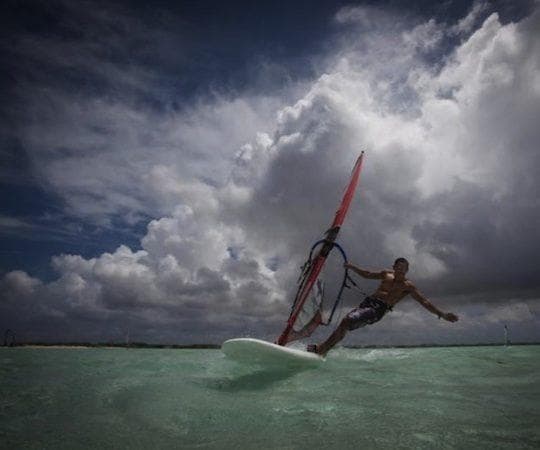Advertisement
Martha’s Vineyard Film Center Gives Festival, And Founder, A Home
Richard Paradise talks about the new Martha’s Vineyard Film Center as if it went up overnight. And by most measures—from vacant lot to velvet curtains in four months—it did.
The stadium seats were bolted down last September, just moments before opening night of the Seventh Martha’s Vineyard International Film Festival (MVIFF), signaling a major shift both for Paradise and the festival he founded.
Until then, MVIFF had roamed venues with Paradise as its volunteer programmer, who was also working a day job. This weekend the festival returns as the center’s flagship event with Paradise as the paid executive director of the nonprofit umbrella for both entities, known as the Martha’s Vineyard Film Society.
Paradise squeezed in a conversation between sold out shows of “Twenty Feet From Stardom,” calling from the parking lot while helping patrons find spots and again after everyone was seated.

“There’s not a bad seat in the house,” he insists. “You could have a 6’8” guy in front of you and still see the screen.” He makes a point to personally introduce almost every show, like “the old days when the owner would greet you outside and knew your name.”
In addition to the festival, the center screens wide-release semi-independent films, like “Stardom” or “Blue Jasmine” and seasonal fare that Paradise programs, which often factors in guest speakers or collaborations with island nonprofit groups. Paradise calls it a smaller version of the Coolidge Corner or Brattle Theatre.
As much as he hopes to draw an off-island audience to MVIFF, the intent, he says, is to bring the world to the Vineyard. The programs make on-screen voyages to Bonaire (“Children of the Wind,” a documentary about windsurfers from Bonaire with a guest introduction by past US boardsailing champion Nevin Sayre); to Argentina (“Viola,” a re-imagining of “Twelfth Night” set in Buenos Aires); and to animated parts unknown in a shorts program curated by animator Bill Plympton, who has assembled a similar event several years in a row.
An international shorts competition is the only juried portion of the festival and one program, “Think Globally, Shoot Locally” features trailers and works-in-progress under 10 minutes by local filmmakers. Dan Martino has coordinated the forum for the last three years. He explains that the format is to show a short and then open the floor to audience members’ questions.
“Some of what we’ll see at the forum will be on HBO or National Geographic or released at independent film festivals,” says Martino, a full-time island resident and co-owner of a private video production company, Martha’s Vineyard Productions. He says he is continually surprised by how many people make a living through film on the island, yet most of their projects take place on other continents.
One documentary produced by Sara Nesson, whom Martino describes as an “island frequenter,” shows a lot of promise. In the three-minute trailer of “Children of God,” narrator Bexy Cameron sets the scene for an investigation into the murky realities of being raised in cults. Nesson directed “Poster Girl,” a 2011 Academy Award nominee for Documentary Short Subject and Martino expects her to be on hand to talk about this work-in-progress.
Another documentary filmmaker and summer resident, Marcia Rock, will show part of an unnamed project about the roles Navajo people and their culture have played in American war service. Rock interviews veterans with dramatic landscapes of Canyon de Chelly as the backdrop. One man describes growing up as African American and Native American and how, over time, he let go of the need to be one or the other. The suggestion is that military service, in part, fostered a more encompassing identity.
Martino, too, will show part of a work-in-progress documentary, “Scow: The Zen of Boatbuilding.” His story follows shipwright Ted Box, an “island character” who may be familiar to anyone who has pulled in to the Vineyard Haven port and seen his 70-foot wooden schooner under construction. “I wanted to document the process, for starters,” Martino says. “There’s a huge generational gap—people don’t build boats anymore.”
Martino says he was getting beautiful footage of Box’s technique when he started to wonder, where’s the conflict? Then Box received notice to vacate the leased land by Sept. 30 or incur substantial penalty fees (the lot’s owner is car dealership executive Ernie Boch Jr.). The boat is not finished and according to Martino, Box doesn’t have a backup plan. “We’ll see what happens,” he says, trailing off.
For a population that hovers around 15,000 in winter and swells to nearly 125,000 in summer, Martha’s Vineyard has a robust slate of film-viewing opportunities, even in the off-season. The Martha’s Vineyard Film Festival enters its 14th year in March 2014 and the Martha’s Vineyard African-American Film Festival just wrapped year 11. While the remaining on-island movie houses may be less appealing than the film center’s 180 plush seats and a brand-new DCI projector and sound system, they’re still bringing the blockbusters people pay to see.
With a center to run, a salary or two to raise, and a festival to kick off, one can see that Paradise has a full plate. But now, at least, he often has a full parking lot to go with the full plate.Erin Trahan edits The Independent an online magazine about independent film.
This program aired on September 4, 2013. The audio for this program is not available.
